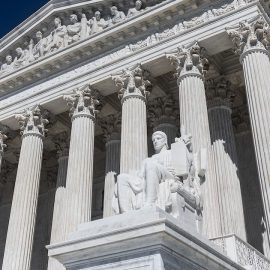

This article is an excerpt from the Shortform book guide to "Strangers In Their Own Land" by Arlie Russell Hochschild. Shortform has the world's best summaries and analyses of books you should be reading.
Like this article? Sign up for a free trial here .
What are the beliefs of white conservatives? Why do they bemoan the loss of cultural dominance, and what are the hallmarks of this culture?
White conservatives cite values such as church, masculinity, and family as the main pillars of their beliefs. These values often are designed to uphold the status quo, a task that’s becoming more difficult in an evolving world.
Read more about white conservatives, culture, and how they hold onto the status quo.
White Conservative Culture
Many Tea Party supporters also bemoan their loss of cultural dominance, with movies and television shows now appearing to cater exclusively to minorities, LGBTQ people, and non-binary people, while portraying non-traditional families in a positive light.
For them, there appears to be no more room in American pop culture for the traditional, white family. As rural white Southerners, people on the right in the Lake Charles area of Louisiana deeply resent demeaning media depictions of their communities as being filled with ignorant and racist “hicks” or “rednecks.”
Distressingly, they find that the values and norms they hold dear—being heterosexual, married, churchgoing, and traditional—are scorned by the media and Hollywood as being backward, out of touch, and even inherently bigoted. In other words, their cherished values and norms are now sources of cultural shame.
For many on the right, these shifting cultural norms and celebrations of diversity and non-traditional family structures in movies and television represent a personal affront. They see the broader culture’s caricature of their way of life as an assault on their honor and dignity.
(Shortform note: For a deeper discussion of this narrative of cultural decline, read our summary of Robert P. Jones’s article “We’ve Reached the End of White Christian America.”)
Expressions of Endurance
The commitment to honor and endurance through struggle finds its expression in different ways. Although people on the right are bound by common political loyalty and shared negative attitudes toward government, they arrive at these positions differently and find different emotional rationales for their political attitudes.
These expressions of endurance fall into three broad character types of white conservatives:
- The Team Player
- The Worshipper
- The Cowboy
But all are based in a shared ethos of endurance, sacrifice, work, and honor.
Type #1: Team Players
Team players in the conservative world are defined by their loyalty to their “team”—in this case, the Republican Party. To be a Team Player is to unflinchingly support the party, its leading political figures, and its affiliated cultural institutions. This finds expression in a celebration of the hallmarks of right-wing American political culture: rural and small-town life, church, and industry. This is an important part of the identity of white conservatives.
One woman interviewed by Hochschild named Janice Areno (niece of Harold Areno, whom we met in Chapter 1) embodies loyalty to the GOP and a belief in its commitment to the value of hard work. As a “self-made” woman who worked her way up from poverty to affluence through effort and sacrifice, celebrating work for its own sake defines her moral world.
In this view, hard work is inherently correct and moral. Getting paid without doing work is not just a waste of taxpayer money; it is damaging to the pride and dignity of the individual and a gross moral violation of the natural order.
Accordingly, Areno believes that people should not be rewarded for their moral failure in shirking work. She is fiercely opposed to any form of welfare, believing that those who do not work should be left to starve and that mothers on cash assistance should undergo forced sterilization, lest they create more mouths for the state to feed.
Her unwavering loyalty to the principles of white conservatives also makes Areno a staunch defender of free-market capitalism. Instead of calling for stricter state regulation of the energy industry, the proper response to environmental disasters is to endure them and be grateful for the bounty of private industry—environmental degradation is just the price of prosperity.
For someone like Areno, it is impossible to accept any alternative. To accept the necessity of some state oversight of the free market would be to concede ground to the other side of the political divide—in effect, to betray her team.
Type #2: Worshippers
In the context of conservative Louisiana politics, the Worshipper accepts pollution and its resultant negative health outcomes in the name of jobs and material wealth. Even tragedies like the Bayou Corne sinkhole are justifiable, because they are a small price to pay for the wealth and prosperity that the free market brings. While pollution may be regrettable, it is something to be endured. In life, sometimes you must sacrifice things you want for the greater good.
One Louisiana woman named Jackie Tabor is a quintessential Worshipper. In detailing her life story, she discusses the series of houses she’s lived in with her husband, each a step above the previous one. But she reminds herself that she couldn’t live in nicer homes or have a better standard of living until she had truly earned it. Striving for too much too fast would have run counter to God’s plan for her and her husband.
There is a deeper lesson here: You shouldn’t grab too quickly for your slice of the dream. Sometimes things aren’t meant to be, and your role is to be happy and accept whatever fate delivers. This ties in nicely with anti-welfare conservative politics. Taxing the “makers” to give to the “takers” runs counter to this ethic of sacrifice and renunciation and represents an unnatural interference with God’s plan. In this worldview, there is an inviolable hierarchy—and some people are simply meant to be at the bottom of it.
Type #3: Cowboys
Conservative Cowboys are motivated by their fierce pride in their independence and belief that risk and danger are necessary parts of life.
For Cowboys, state regulations forbidding a company from dumping waste in a bayou or mandating individuals to wear seatbelts make people weak and dependent on the government for their own safety. The only way the United States was able to develop into an advanced economy and society, they claim, was because entrepreneurs had the freedom to take risks. And risks are essential to progress.
A Cowboy doesn’t run to the government for a handout when he gets into an accident on the job or contracts cancer through exposure to chemicals. He recognizes that he is the only one responsible if he gets hurt or sick—not the company and certainly not the government.
This worldview is closely tied to traditional notions of masculinity. A real man values toughness, endurance, bravery, and honor. It is unmanly and dishonorable to rely on the government or to seek redress for your problems through the legal system. A real man instead sucks it up, grits his teeth, and solves his own problems.
This attitude is backed up by sociological data. One 1997 study found that white males engaged in the most risky manual labor professions were significantly less concerned about exposure to dangerous occupational conditions than workers who were less exposed to danger on the job.
One Louisiana man named Donny McCorquodale embodies the conservative cowboy archetype for white conservatives. He believes that even the most basic safety regulations are unnecessary and harmful. When discussing the possibility that an old petrochemical leak from 1994 might threaten the structural integrity of a nearby bridge—one that happens to carry an average of 50,000 vehicles per day—McCorquodale insists that it is not the government’s role to guarantee public safety.
He does so on explicitly “cowboy” grounds, arguing that risk is an important and necessary part of progress. Regulation, he says, threatens to stifle innovation and entrepreneurship. It’s impossible to make an entirely safe world—and any attempt to do so is an inversion of the “natural order.” As for those unfortunate souls who happen to contract cancer because they drank poisoned water or died in a bridge collapse caused by chemical leaks that undermined the piling supporting the bridge? They are just collateral damage, their lives the price of freedom and progress.

———End of Preview———
Like what you just read? Read the rest of the world's best book summary and analysis of Arlie Russell Hochschild's "Strangers In Their Own Land" at Shortform .
Here's what you'll find in our full Strangers In Their Own Land summary :
- What drives right-wing politics in America
- How a lack of empathy is increasing the partisan divide
- Why Republican politicians remain popular even if their policies don't help their voters






